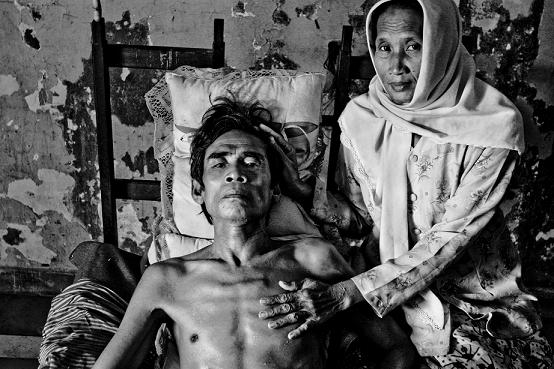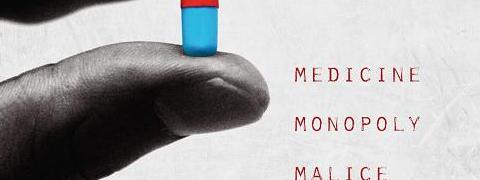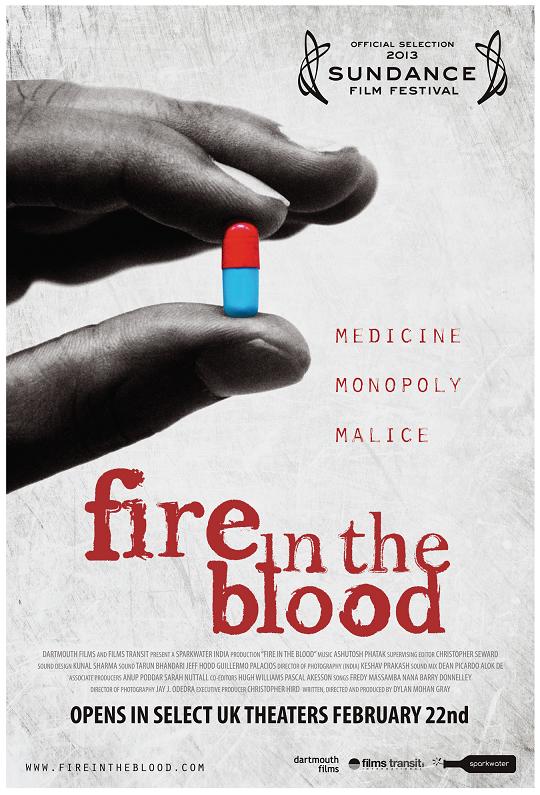[dropcap style=”font-size:100px; color:#992211;”]M[/dropcap]ost, if not all of us are aware of the continuing issue of AIDS in the third world, but not so many have heard the story of the West’s part in this.
Shocking and at times moving, Fire in the Blood is certainly emotive. Sporting a tagline of ‘medicine, monopoly, malice’, the purpose of this documentary is to inspire outrage, and it does just that.
Featuring a good mix of talking heads and archive footage, Fire in the Blood comes to us from first-time filmmaker Dylan Mohan Gray. He was certainly ambitious, taking on the roles of director, writer, producer and editor; clearly this is something of a passion project for him.
Nevertheless, the documentary does not hand-hold and spoon-feed the viewer’s opinion to them in the manner in which the incendiary Michael Moore does. Instead, it relies on facts and its interview subjects to drive it, Gray’s voice-over taking a matter-of-fact tone.
[quote]does not hand-hold and spoon-feed[/quote]
The methodical outlining of Big Pharma’s stance on profit before healthcare is no surprise, however the story told here is simply astonishing considering the sheer indifference to the millions of lives lost. First coming to public attention in the 1980s (the ‘tombstone campaign’ remains notorious) AIDS was once considered a death sentence until the antiretroviral (ARV) drug breakthrough in the ’90s.
However, while Western patients had ready access to medication, treatment costs of $15,000 per patient meant these drugs were out-of-reach for the Third World, where the vast majority of HIV cases were, and are. Fire in the Blood tells the battle against this medication blockade, or the ‘crime of the century’, according to Gray.
Gray gathers a varied group to talk us through this battle, including Bill Clinton, Desmond Tutu and Joseph Stiglitz, but the most fascinating insights come from Zackie Achmat of the Treatment Action Campaign (who refused AIDS treatment for himself until it was available for all South Africans) and whistleblower Peter Rost, former VP of Pfizer.
The latter’s brutally frank commentary tells us what we’re already aware of, that the US will only act when in its own interests to do so. Nevertheless, his words are chilling, coming from the horse’s mouth. In fact, it is tough to watch Fire in the Blood without becoming angry.
[quote]a prejudice that went as far as to say Africans don’t know how to use clocks[/quote]
A shocking level of racism is shown, resistance coming from R&D departments who expressed concerns the virus would mutate if the drugs weren’t used properly—a prejudice that went as far as to say Africans don’t know how to use clocks (Andrew S. Natsios, formerly of USAID) and are too illiterate to understand the instructions (Jan Raaijmakers, GSK).
This type of ignorance was merely a thin veil to cover Big Pharma’s true concerns, which, of course were/are financial. The cost of Pfizer’s Diflucan was $50 per capsule in South Africa, while a generic version at 50 cents was available in Thailand. International patents, however, made importing the cheaper drug illegal, Pfizer effectively creating a monopoly for itself.
Herein lies the crux of Gray’s documentary: the insurmountable opposition for Yusuf Hamied’s Cipla, a socially conscious pharmaceutical manufacturer that was looking to challenge patent laws and slash the costs of generic ARVs for poor countries. Finding no support for this, Hamied’s next proposal was to charge only for ingredients; again, this idea was opposed by a frighteningly powerful pharmaceutical lobby, but an increasing political and public pressure eventually saw some success, making for some moving scenes that convey the positive impact had on African lives.
The battle, however, is not over.
An essential watch that is laden with information, what is admirable about Fire in the Blood is Gray’s decision to not take a political slant—an easy, obvious approach—allowing the story to speak for itself purely from a humanitarian angle. The message to take with you is clear: a healthcare industry that is allowed to continue monopolising the world will see many more needless deaths, all in the name of indifference and bottom dollar.
A disturbing implication is of course that, with the disassembling of the NHS in the not-too-distant future, the same principles will begin to affect us, too….
In UK Cinemas from February 22nd
Naila Scargill is editor and publisher of Exquisite Terror, an academic take on the filmic horror genre. www.exquisiteterror.com

Naila Scargill is the publisher and editor of horror journal Exquisite Terror. Holding a broad editorial background, she has worked with an eclectic variety of content, ranging from film and the counterculture, to political news and finance.






















